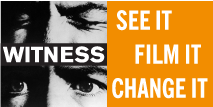Published March, 2016 by WITNESS in News and Updates
WITNESS Launches Video as Evidence Guide for Citizens, Activists, Lawyers
Brooklyn, NY – March 30, 2016 – WITNESS is proud to announce the publication of the Video as Evidence Field Guide – the first-ever resource for citizens, advocates and lawyers using video in human rights investigations and court cases at local, regional and international levels.
In our cameras everywhere world, the number of civilians using video to document abuses, war crimes, and more has grown exponentially. Citizen witnesses, not trained human rights investigators, are often first on the scene. However, while there is more video than ever, the quality of this footage rarely passes the bar needed to serve as evidence. WITNESS’ new guide is poised to change that. The Field Guide provides practical guidance, case studies, checklists and more to help activists and lawyers better collaborate, in turn, strengthening the likelihood that their videos can be used in court, for advocacy, and be trusted by the media.
The Field Guide draws on WITNESS’ nearly 25 years of supporting and training human rights advocates to use video to document abuse and as a tool for justice including at the Inter-American Commission of Human Rights and the International Criminal Court. One of the biggest drivers in creating the guide was our experience supporting Syrian activists.
“While no conflict has been as thoroughly documented as the Syrian war, the footage many activists risk their lives to capture has not had the desired effect of prompting action to stop human rights abuses. Furthermore, they seek long-term justice and accountability,” said Kelly Matheson, Senior Attorney and Program Manager at WITNESS, and author of the Field Guide. And if last week’s verdict against Serbian war criminal Radovan Karadzic (he was on the run for 13 years and his trial took five) is any indication, Syria’s road to justice may be long.
The Video as Evidence Field Guide was written with universal principles at its core and is adaptable to global contexts whether in Syria, Brazil, the Central African Republic, the United States or beyond. Translations of the Guide are already underway in Arabic, French, Russian, Spanish, and Ukrainian, with more planned.
The Video as Evidence Field Guide includes:
- All About the Law: Basic legal principles and processes every activist should be familiar with;
- Basic Practices: How to safeguard, organize and manage your videos to ensure they can be accessed and used by investigators, attorneys and judges;
- Filming for Evidence:
- Camera techniques for capturing video with enhanced evidentiary value;
- Proving responsibility through linkage evidence
- Filming Interviewing: Including an overview of informed consent
- Sharing and Verifying: Guidance on whether to post your video or not and if you decide to post, practices for posting human rights footage; ensuring a video you film or footage you find can be used as evidence;
- Case Studies From the Field: Stories illustrating how video has been used throughout the justice process and presented to courts;
- Mini Guides: Illustrated summaries for quick reference of many sections;
- And much more.
Download the guide for free here.
Watch a video teaser here and join the conversation online at #VideoAsEvidence.
Related Events:
29 March – DocuDays film festival in Kyiv, Ukraine – a training will be held for documentary filmmakers including an overview of the Field Guide.
Today – RightsCon in San Francisco – Yvette Alberdingk Thijm, WITNESS’ executive director discusses the Field Guide on a panel.
Today – Twitter chat with Women Under Siege, a project of the Women’s Media Center and Matisse Bustos-Hawkes of WITNESS from 2-3pm EDT. Join the conversation #VideoAsEvidence @witnessorg @womenundrsiege and @matissebh.
2 April 2016 American Society of International Law annual meeting, Washington, D.C. – The Field Guide’s author Kelly Matheson speaks on panel about video as evidence.
###
About WITNESS: WITNESS trains and supports activists and citizen witnesses around the world to use video safely, ethically, and effectively to expose abuse and fight for human rights change. Since our founding in 1992, WITNESS has trained and partnered with thousands of people using video for change around the world.

